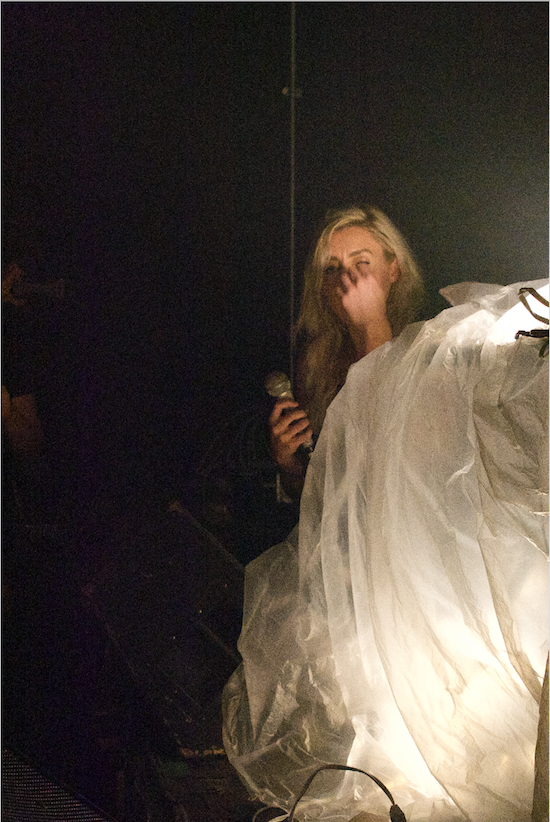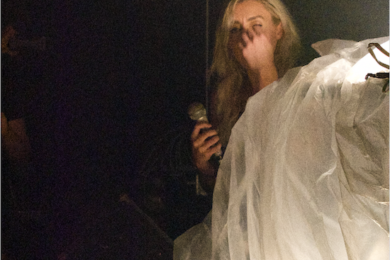All live photographs courtesy of the author
“My mother often told me. You shouldn’t care if an action is right or wrong; you should totally care if you’re going to profit monetarily from it.
"The helmeted bowlegged stiff-muscled soldiers ramble on just-born babies swaddled in scarlet violet shawls, babies roll out of the arms of women crouched under POP’s iron machine guns… of the driver’s studded heel crushes.
"As he pulls hair out of the back of his head onto the sheet metal some stones
blow up
"My mother is the most beautiful woman in the world.”
This text is a passage from the late transgressive fiction writer Kathy Acker’s 1981 masterpiece Great Expectations. However, the centre paragraph was actually lifted, or “pirated” as was Acker’s preferred term for the practice, from French author Pierre Guyotat’s masterpiece Eden, Eden, Eden. And of course the book’s title is pirated from the masterpiece of the same name by Charles Dickens, which Kathy also re-wrote the first passage of to open her book. In the appropriation of her favourite texts, Acker framed her artistic and philosophical interests as inseparable from her literary identity. The appropriated texts weren’t just Acker’s influences, they were the texts that she used to explore her own role in literature and culture. And despite Acker’s reliance on heavy academic research, her work was undeniably personal. It was a primal and visceral expression of rage, anxiety, and desire that was derived from an intense practice of studious rigour.
“A significant element of Acker’s creative process was her personal library,” wrote Julian Brimmers for the Paris Review. “She was an avid and active reader. She frequently marked passages that she later pirated for her own novels. Most important, she used margins, blank pages, and empty spaces in front matter to formulate spontaneous ideas about her own art and (love) life—a glimpse into the writer’s mind at its most unfiltered.”
I thought of Acker’s incorporation of diligent reading and research into a raw, unfiltered expression after witnessing LINGUA IGNOTA, AKA the providence-based musician Kristin Hayter, perform tracks from her new album CALIGULA at Saint Vitus in Brooklyn. Like Acker, Hayter immerses herself in art and history to fuel her intense expression. Writing for the Village Voice, Jamie Lowe said: “The first time I saw Kristin Hayter perform as LINGUA IGNOTA she was presenting her MFA thesis at Brown. She delivered striking operatic tones while behind her played black and white video footage of serial killer Aileen Wuornos, Pino Bausch choreography to Igor Stravinsky’s Rites of Spring and burning buildings. When she finished her set, at least three audience members were in tears.” There you have it. Hayter, like Acker, allows us to see her research as a way of emphasising her interiority, her alterity, and her emotional state; her research enhances the emotional impact of the work rather than dulls it.
Hayter’s 2017 record as LINGUA IGNOTA All Bitches Die was an intense listen in its combination of noise, black metal, experimental electronics, and classical/choral influences. That said, it felt more like the start of something then the culmination of an idea in comparison with CALIGULA. Her latest LP is a masterpiece that perfectly balances her music’s overwhelming extremity and potent beauty. A survivor of harrowing abuse at the hands of a well-known but unnamed Providence noise musician, Hayter presents her sound and performances as rituals of excess catharsis, taking elements from spiritual music, the history of transgressive performance art (traces of Viennese Aktionists and early feminist artists like Carolee Schneeman enhance her performative style), and the well-worn clichés of extreme music that Hayter seems to both embrace and retain critical distance from in her visual packaging and performances.

There are several distinctions between Hayter and her extreme contemporaries that set her apart in terms of conceptual intrigue and aesthetic pleasure. For one, Hayter is a classically trained vocalist. Her voice oscillates between howling, shrieking exorcisms of rage and despair and mournful, staccato hymns of astonishing beauty. Second, whereas so many harsh noise and extreme metal artists present extremity for its own sake, no more than an infantile expression of adolescent rage, Hayter’s music is made with purpose: expelling trauma and reclaiming power.
Finally, the breadth of influences in her work is particularly wide and audible in her sound: the noise of Merzbow, the extremity of Cattle Decapitation, the experimental vocal stylings of Klaus Nomi, and liturgical innovations of 12th Century German philosopher, abbess, visionary, writer and composer Hildegard of Bingen among them.
That last artist mentioned, Bingen, gave Hayter her project’s name. Lingua Ignota was a language pioneered by Bingen and accepted by the Church as an important modification of liturgical hymns. It’s easy to see why Hayter feels connected to the Medieval saint considering that her musical innovations were so profound that she was embraced by the male dominated culture she existed within.
Given her project’s name, it’s safe to assert that Hayter is more studied in her chosen medium’s history than the average musician making noise or extreme music. Like Acker, who immersed herself in theoretical academia under the influence or direct tutelage of professors ranging from the activist and writer Angela Davis to the artists/academics Eleanor and David Antin, Hayter comes from an intellectual background. Hayter earned a BFA from SAIC before going on to receive her MFA in literary art from Brown University. Acker was able to ground her artistic output in a high level research-based practice: she literally made reading a focal point of her writing. Similarly, the genesis of the LINGUA IGNOTA project was forged in Hayer’s fascinating thesis project at Brown. Entitled Burn Everything, Trust No One, Kill Yourself, Hayter’s thesis was a 10,000 word manuscript composed of appropriated textual materials: lyrics, message board posts, and liner notes from various extreme music sub-genres exploring the mythologising of misogyny in extreme music culture.
Also, Hayter included the court papers, audio recordings and police filings from her own experience as a victim of abusive violence. One gets the sense that Hayter, like Acker before her whose writings often pulled experiences directly from her own life and filtered them through French postmodern and feminist theory, uses rigorous research to connect her personal experiences to a broader historical and philosophical awareness. Hayter’s personal experiences fuel her academic works, and her academic work fuels her creative expression. While both artists use postmodernist techniques in terms of reference and appropriation, the overall approach is modernist: Acker created and Hayter is creating something entirely singular and new.

The Acker-esque cerebral and intellectual quality of Hayter’s work is fully on display at Hayter’s show at Saint Vitus. Hayter walks from the back of the venue through the crowd and to the stage singing CALIGULA opener ‘FAITHFUL SERVANT FRIEND OF CHRIST’. The track, a liturgical hymn most likely in reference to St. Jude or “the patron saint of lost causes” allows Hayter to demonstrate the breathtaking range of her classically trained vocal cords. She has fun with the song, applying a soulful twang to the delivery that doesn’t diminish the emotional intensity. The performance, a dark analog of vocal jazz, made me think of singers as disparate as Nina Simone and Fiona Apple.
During ‘DO YOU DOUBT ME TRAITOR?’ Hayter performs behind white fabric which alters in colour slowly rendering her an eerie, black silhouette, calling to my mind art historian Linda Nochlin’s ideas about corporeal fragmentation as a signifier of personal and cultural revolution. The song combines some of her most lacerating lyrics ("I don’t sleep I don’t eat I don’t sleep I let it consume me") with minimal, ominous keys. Hayter’s vocals bleed with orchestral beauty and intensity as she pleads for a guide ("Satan can you get beside me?") before degenerating into shrieking howls of disgust and liberation in equal measures. The song’s closing polyphonic moment is an homage to the medieval song ‘Chanterai pour mon Corage’, once again framing Hayter as an artist aware of her place in history. But even if the audience don’t know the song, they remain spellbound by the visceral honesty of Hayter’s performance.
When playing ‘BUTCHER OF THE WORLD’, thanatos and eros collide in violence and beauty. Hayter is back in the crowd; her physical gestures suggest she is baiting an audience while pleading for their help. The song samples Henry Purcell’s Music For The Funeral Of Queen Mary: consequently adapted as the main theme of Stanley Kubrick’s A Clockwork Orange (“a cultural signifier of stylized violence,” says Hayter). When performing songs like this, her art is at its most sublime, a Kristeva-ian balance of the abject and the life-affirming. Her screams erupt at their most harsh and chaotic extent; they are truly stunning, considering she reported being sick earlier in the day on her Instagram. (This almost makes one afraid to consider a LINGUA IGNOTA performance when Hayter is at full health.) “May there be no kindness,” lulls Hayter as the song reaches its close. Despite the astonishing beauty of her voice, Hayter’s lyrics can oscillate between trauma and a phallocentric dominance which mimics the journey of a survivor where the aggressed against seeks to become the aggressor.
On CALIGULA track ‘If The Poison Won’t Take You My Dogs Will,’ she explores suicide as a final option through the prism Jim Jones’ manipulation of his cult via audio, right through to their bitter end. During its performance, Hayter’s voice achieves operatic emotionality, dialling down live processing and effects in favour of an ethereal piano melody that grounds the audience in a shared state of despair/bliss. When the set concludes with CALIGULA‘s closing track ‘I AM THE BEAST’, we are moved from anguished lyrical prose ("All I know is violence") into an epic crescendo of thick, industrial distortion, signifying violence and pain. Her performances demand you give yourself over to her pain. And you have to follow suit.
In her music and performances, LINGUA IGNOTA often analyses the point of view of fear mongering from privileged males, although those with a tenuous grip on power. This could be a direct indictment of her abuser, but she sometimes chooses to see through this viewpoint, almost as if trying to grasp at what that kind of domination would feel like. (“I am really interested in the ‘gaze of this music,’” she said recently to Louder Sound, “who is being looked at and who is doing the looking”.)
Here, I detect another spiritual alliance between Acker and Hayter. Both artists, while decidedly feminist, were/are largely at odds with the feminist conventions of their day. Acker’s hyper focus on S&M saw her bear the brunt of criticism from feminist academics of the late-1970s. Instead, Acker pioneered her own brand of feminist excess inspired by the transgression and violence of male writers like Bataille, de Sade, and Artaud. This movement, defined by Australian literature professor Margaret Henderson as “punk feminism,” was at odds with the second wave of Gloria Steinem, “anti-porn” feminism of the 1970s. Hayter is likewise engaging in historically hyper-masculine aesthetics (black metal, noise, industrial) and using it to carve out a very interesting space. She considers herself, along with artists like Philadelphia-based industrial hip hop producer and poet Moor Mother and non-binary noise musician Dreamcrusher, to be a part of a movement of female/female-identifying/femme/non-binary artists “appropriating male-dominated aesthetics to serve really authentic and important identities,” as she described it in 2018 on this site.
Hayter and Acker exist on a continuum. They are artists of polarities: academic and primal, weak and powerful, masculine and feminine, sane and unhinged. Both artists dispel notions of academics being “chilly, removed and detached” as well as notions of extreme art being “dense, infantile, and macho.” Hayter occupies a unique position in contemporary sound. While sharing stages with some of the most interesting heavy bands of today (The Body, Uniform, etc.), she also is in a lineage of intellectual female performers that used academic research and transgression as an emotional appeal: Acker, but also performance artist Karen Finley, singer/performer Diamandá Galas, poet and songwriter Lydia Lunch and more. With the release of her second album, Caligula, and the tour in support of it, LINGUA IGNOTA has become to contemporary extreme music what Kathy Acker was to 1980s transgressive literature.



